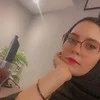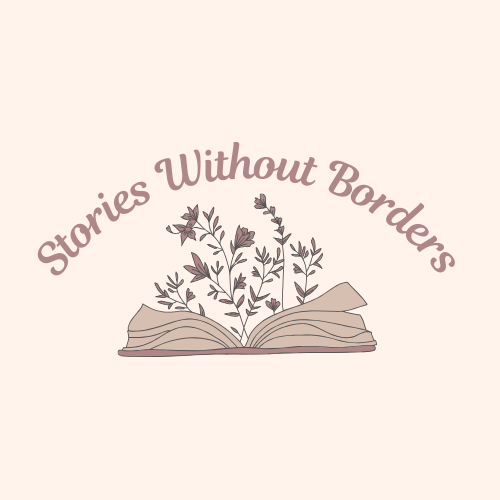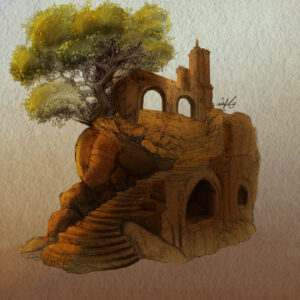Ayat From Palestine
Categories: Interview
This illustration is created by Ayat, a refugee from Palestine.
Transcript
Fariah: Interviewer, Project Lead for Stories Without Borders

About Ayat
Ayat is a digital artist passionate about creating unique and visually captivating artwork. With a background in graphic design and traditional art, she combines classic techniques with cutting-edge digital tools to produce innovative and timeless pieces. She collaborates closely with filmmakers, animators, and other creatives to develop cohesive visual styles that enhance storytelling. Committed to excellence, Ayat continually pushes the boundaries of visual development, crafting unforgettable worlds and characters. Follow her on LinkedIn.
Interview Transcript
Brief Glossary
There are certain terms and phrases in this interview that are commonly used by Muslims.
Assalamu Alaikum Wa Rahmatullahi Wa Barakatuhu: May peace, mercy, and blessings of Allah (God) be upon you.
Alhumdulillah: All praise belongs to Allah
InshaAllah: God-Willing
JazakAllah Khair: May Allah reward you well
Du’a: A form of prayer
Beginning of Transcript
Fariah:
Assalamu Alaikum, Peace be upon you, Hello everyone, Welcome to Stories Without Borders, a platform to share the stories of refugees in Canada. Today, we’ll be interviewing Ayat to learn more about her life experiences. Ayat is a Palestinian refugee from Gaza and is a talented digital artist, painter, illustrator and animator with exceptional knowledge of Blender, concept art and environment illustration.
Ayat, thank you so much for being with us today. Your journey is very inspiring, and I’m grateful to have the opportunity to learn from you. To start, is there a particular story or experience from your life that stands out to you—something meaningful that you’d like to share?
Ayat:
Hello, how is your day? How is it going? Thank you for getting me today.
My story began in Gaza where I worked as a digital artist and found happiness in my daily life despite the challenges. However, everything changed after October 7th when war broke out and turned our life upside down. We were forced to leave everything behind, our dreams, our homes and even the smallest detail of our lives in search of safety. The journey was anything but easy. We endured hunger, cold, and constant fear of death.
After a year, Canada announced a special program to accept people from Gaza, offering them safety and a chance at a new life. This program felt like our last hope, lifeline, when we had lost everything. We applied, waited anxiously for approval, and eventually received a code that allowed us to travel to Egypt for biometrics at the Canadian embassy. Leaving Gaza was challenging in itself, and we had to sell everything we owned and pay $5,000 per person to secure our way out. Fortunately, we managed to leave just two days before the border was closed indefinitely.
Once in Egypt, we spent six months waiting for Canadian visa, struggling with uncertain future in country where we had no work, no connection. Finally, we received our visa and it felt like true lifeline, a new beginning away from fear, terror and destruction.
Fariah:
Thank you for sharing, Ayat. That’s a very powerful experience, and I appreciate you opening up about it. It’s amazing how resilient the Palestinian people are. How did your faith support you during your experience?
Ayat:
Yeah. Okay, about my faith. As a Muslim, my faith has been my source of strength. Islam teaches us to trust in God’s plan. And the Prophet Muhammad, peace be upon him, encouraged optimistic when he said, expect good and you’ll find it. The Quran also reassures us with a verse, and We shall bring them out from darkness into light by Our will. No matter how lost you are or how broken I felt, my unwavering trust in God helped me push through. Even in darkest times, I believed that a better day would come and that faith gave me hope and resilience.
Fariah:
Thank you so much. That’s very inspiring, Ayat. It’s beautiful how faith can provide us with strength. Thank you so much for sharing that. How is it like living in Canada as a refugee?
Ayat:
Okay. At first, the biggest shock was weather. I never imagined such a freezing temperature, but over time, I adapted. Canada is a peaceful and stable country. and the people here have been incredibly kind and supportive. The Arab community has also been very helpful, guiding us towards job opportunity and education options. However, there are challenges. One of the biggest obstacles is employment. Canada companies often require Canadian experience, so Canadian degree regardless of the experience you had in your home country. So many refugees have to start from zero, even if they were highly skilled professionals back home. Without credential recognition, working in my field feels almost impossible, unless I go back to school or getting my qualification assessed.
Despite these difficulties, life here offers stability and security, which is something I deeply appreciate. So we are still in the process of understanding this new country and hopefully one day, maybe one day, we will have the opportunity to truly build a future here.
Fariah:
Thank you so much. Adjusting to a new country is such a complex journey, and I appreciate you sharing both the challenges and the positive moments. Before we wrap up, is there anything else you’d like to share—whether about your journey, your hopes for the future, or anything else on your mind?
Ayat:
Not really. Yeah maybe, I guess I hope someday I’ll be working in a company in the game industry field. I hope so.
Fariah:
Yeah, I hope so too. I wish you all the best, Inshallah. Thank you so much for sharing your story with us today. Your journey is very inspiring, and I appreciate your honesty and insight. I wish you all the best moving forward, and I hope your story inspires many others. Take care, and Ramadan Kareem
Ayat:
Ramadan Kareem. Thank you so much for getting me today.

